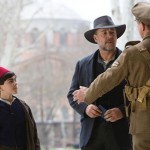Robert Tanitch reviews the latest DVDS
DEAD OF NIGHT (StudioCanal). A famous 1945 Ealing Studios portmanteau film: a series of classic supernatural stories are cleverly framed as the recurring nightmare of one man (Mervyn Johns). Two episodes stand out in particular.
The haunted Victorian mirror is first-rate melodrama with Googie Withers and Ralph Michael. There is also a memorable performance by Michael Redgrave as a mad ventriloquist who reverses roles with his sinister dummy who takes on a life of his own. The surreal finale brilliantly mingles all the stories for a superb climax.
CLASSE TOUS RISQUES (BFI). Honour and dishonour among thieves: a major exciting French thriller from 1960. Skilfully directed by Claude Sautet, and with impressive convincing performances by Lino Ventura and Jean-Paul Belomondo, it deserves to be much better known. A gangster (Venture, an actor of weight) is on the run with his two very young sons. His criminal friends let him down badly. A complete stranger (the young and charismatic Belomondo) comes to his aid.
ONE CHANCE (Entertainmment on Video) is a heart-warming, sentimental tearjerker, loosely based on fact. Port Talbot Carphone shop manager Paul Potts wins Britain’s Got Talent Contest and his dream of earning his living as an opera singer comes true. James Corden, surprise casting, is surprisingly serious. Also on offer is a tourist trip to Venice, arias from Puccini’s La Boheme (always worth listening to) and adorable Alexandra Roach.
MISTER JOHN (Artificial Eye). An Irishman (Aidan Gillen) goes to Thailand to attend his brother’s funeral and is persuaded to wear his clothes and assume his identity. He is drawn into his brother’s exotic, erotic world of beautiful women, all prostitutes. Most audiences are going to be as disorientated as the Irishman and wonder what is going on.
GEORGE FORMBY BOOTS! BOOTS!/OFF THE DOLE (Odeon). Gormless naivety, plus big smile and ukuele: the Lancashire comedian financed these two crude, extremely low budget, early 1930’s cardboard films and launched his highly successful film career. Both scripts offer a string of old-style music hall comedy routines and they are, with two exceptions, absolutely dire.
To learn more about Robert Tanitch and his reviews, click here to go to his website









